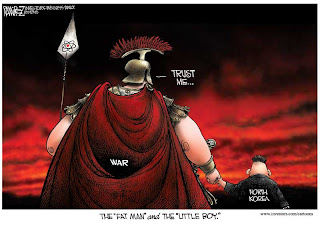Well...just in case you were tiring of news about the sequester, the job and housing markets, European economic collapse, or corruption in WashingtonChicagoNewYorkCity politics, Kim Jong-un has been quite busy stirring up alternatives for your morning-cup-of-coffee reading. If you're in the habit of more than one cup, here are a couple of sites you might find of particular interest:
- War News Updates has extensive coverage but this website should be on your daily reading list regardless. The editor (who lives in Canada) uses tags for sorting reporting on North Korea if you'd like to sort by sub-topic (missile capabilities, North-South relations, etc) but you'll get all the latest reporting by just scanning the website.
- Galrahn with a very good post at his naval blog Information Dissemination on the background story leading up to our annual military exercise with the South Koreans, an event that sends the North into a tizzy every year. He details the 'playbook' developed and implemented to leverage this year's exercise as a 'strategic messaging' initiative to a greater extent than is normally the case each year. Interestingly, the North's more-than-usual animated response threw the US message off track. As you're seeing in the news, all the major players (US, South Korea, Japan, and China) are waiting to see just how closely North Korea's actions reflect its hyperbolic rhetoric.
But if you really want to understand the North Koreans, there's no better item to read than this: "The 1951 Korean Armistice Conference: A Personal Memoir," by Herbert Goldhamer, who dictated it in 1951, and which was released by RAND as a monograph in 1994. Goldhamer's memoir was recommended to me (following some work I did at U.S. Central Command in the immediate wake of the 9-11 attacks) by the fellow who wrote the Forward, from which I share this extract:
"In his Memoir on the Korean Armistice Conference, Goldhamer shows how American beliefs and values made for disadvantageous negotiating performance. He points out how members of the U.N. side were determined to behave honorably. The North Koreans and Chinese were able to take advantage of this attitude by constantly challenging their ethical behavior, forcing them to demonstrate their morality, sometimes to the detriment of the U.N. position. Also, in a section entitled, "Strength Leads to Failure, Weakness Leads to Success," Goldhamer points out that because the U.N. negotiators assumed the North Koreans and Chinese would be intransigent, "... there was a tendency to assume, in considering any possible line of action, that if the action was a strong and aggressive one the outcome would probably be a failure.... On the other hand, any action that was a sign of weakness, for instance a concession, was in some obscure way looked upon optimistically.""
-- A.W. Marshall, 1994, Forward
Goldhamer's point was essentially this: the North Koreans behave like bratty children who throw a tantrum when ignored and who will bully, bluster, threaten, and angrily pout to get their way. Conversely, the West, and especially the U.S., just hates the idea it might be seen as anything other than the 'mature, understanding parent' so it wants nothing more than to mollify the scene-making child. So, it gives in. The North knows this and has had proven time and again this is how the West/America will respond. With Jong-un newly ascending to power this is likely -- likely -- a situation wherein he and his handlers see an opportunity to gain attention on the world stage (especially with the US hindered by war fatigue, debt problems, and domestic political discord) and make some gains vis-a-vis concessions from the West re the DPRK nuclear program, etc. One should also keep in mind the South Korea also has new, untested leadership.
Most commentators I've read feel the North will fire a missile or two into adjacent waters to make a point, declare victory, and go back to starving its people. But there is always the possibility for miscalculation, misinterpretation or simple mistakes when things are on a knife edge and everyone is unsure of just what might happen. When folks are running around in the dark with loaded weapons and fingers on triggers, lots of bad things can go wrong even if no one really wants them to.
I'm reminded of one of the final scenes in Le Morte D'Arthur where the armies of Arthur and Mordred are arrayed against each other on Salisbury Plain. While the two principles are preparing to engage in negotiations a knight sees a snake in the grass and innocently, unthinkingly, draws his sword to kill it. The action is perceived by everyone else in proximity as a signal to attack and the two sides surge to war. Mordred dies as do most of Arthur's knights, Arthur himself receives an ultimately fatal wound, Guinevere follows him from anguish and, learning of her death, Lancelot likewise passes.
Brinksmanship is a tricky game.

No comments:
Post a Comment